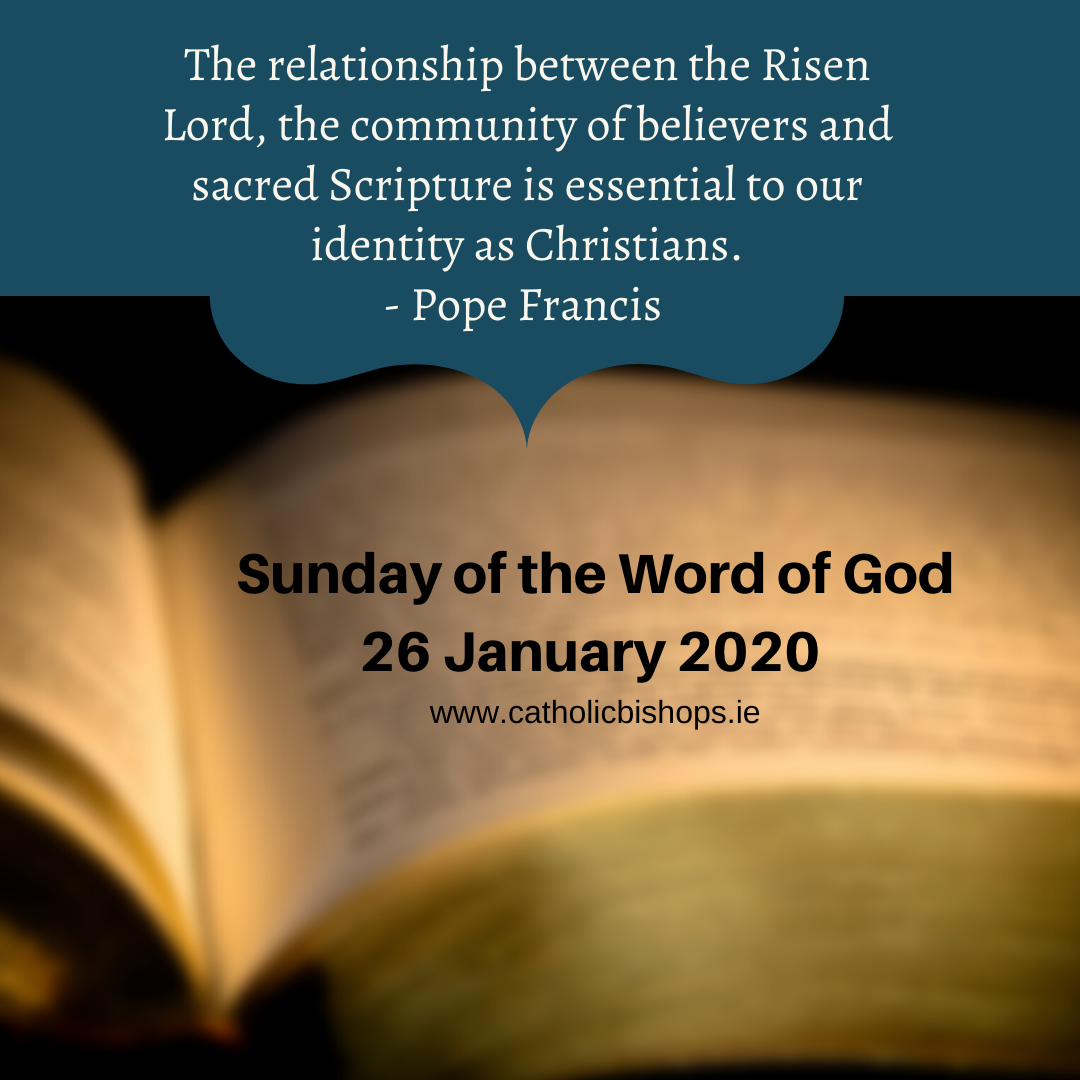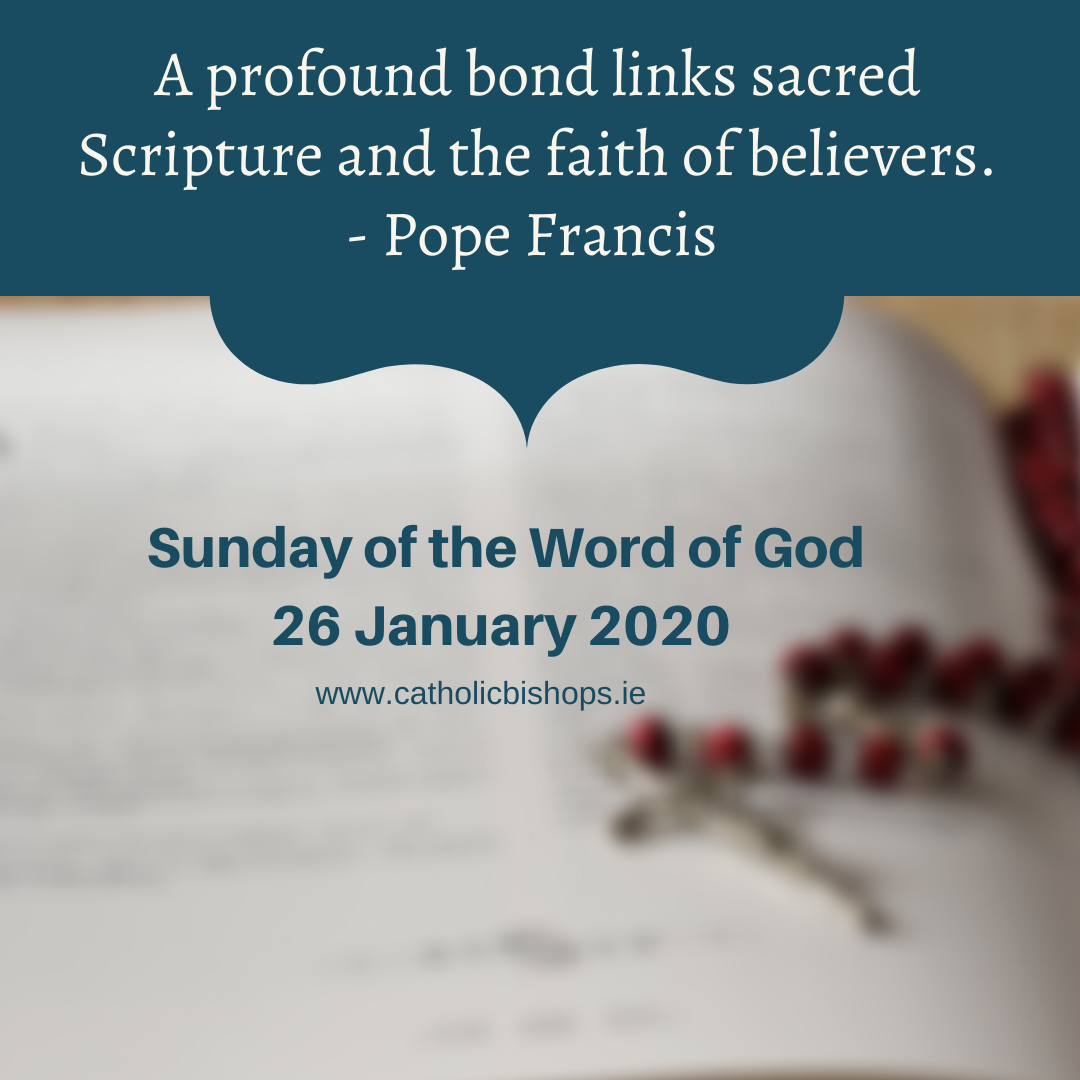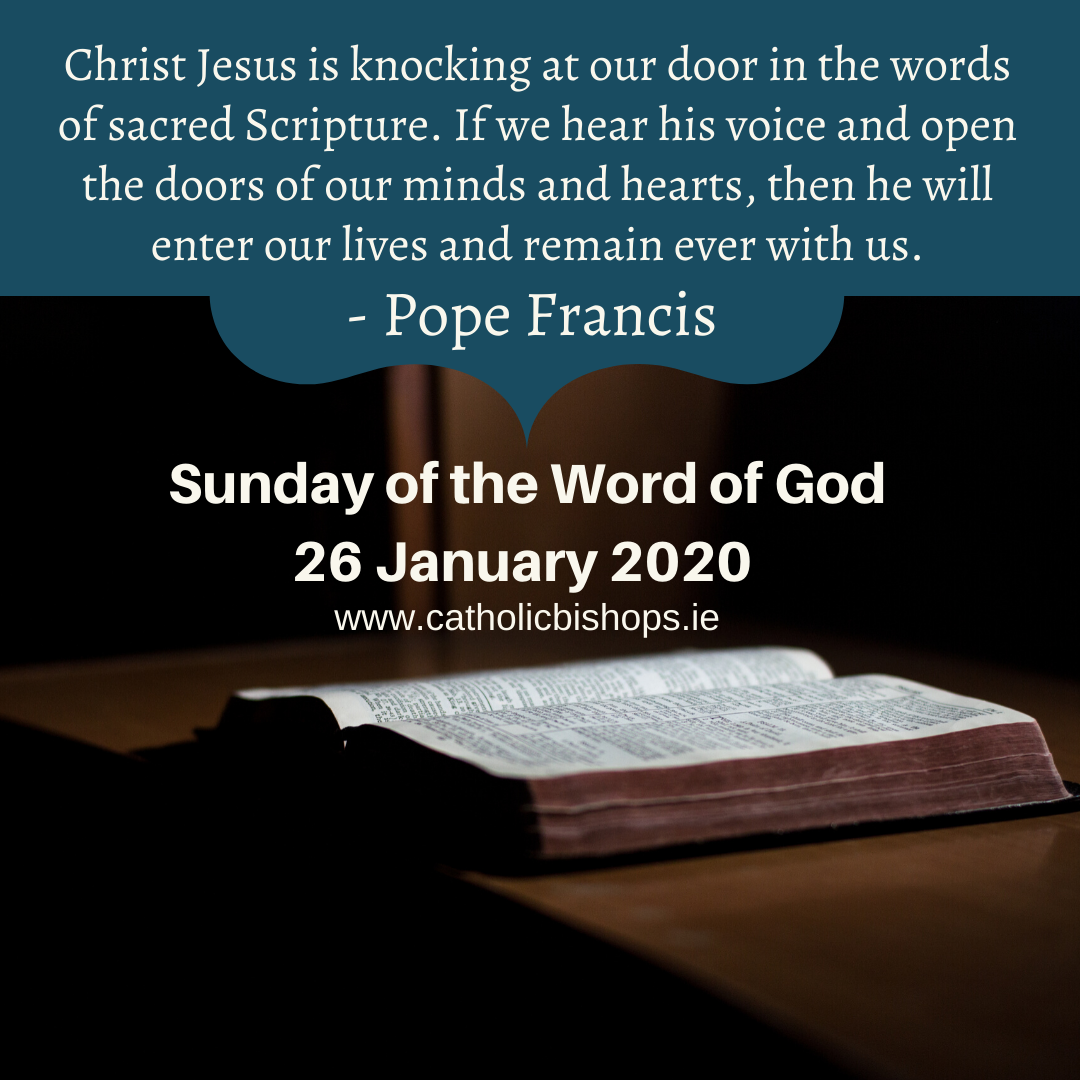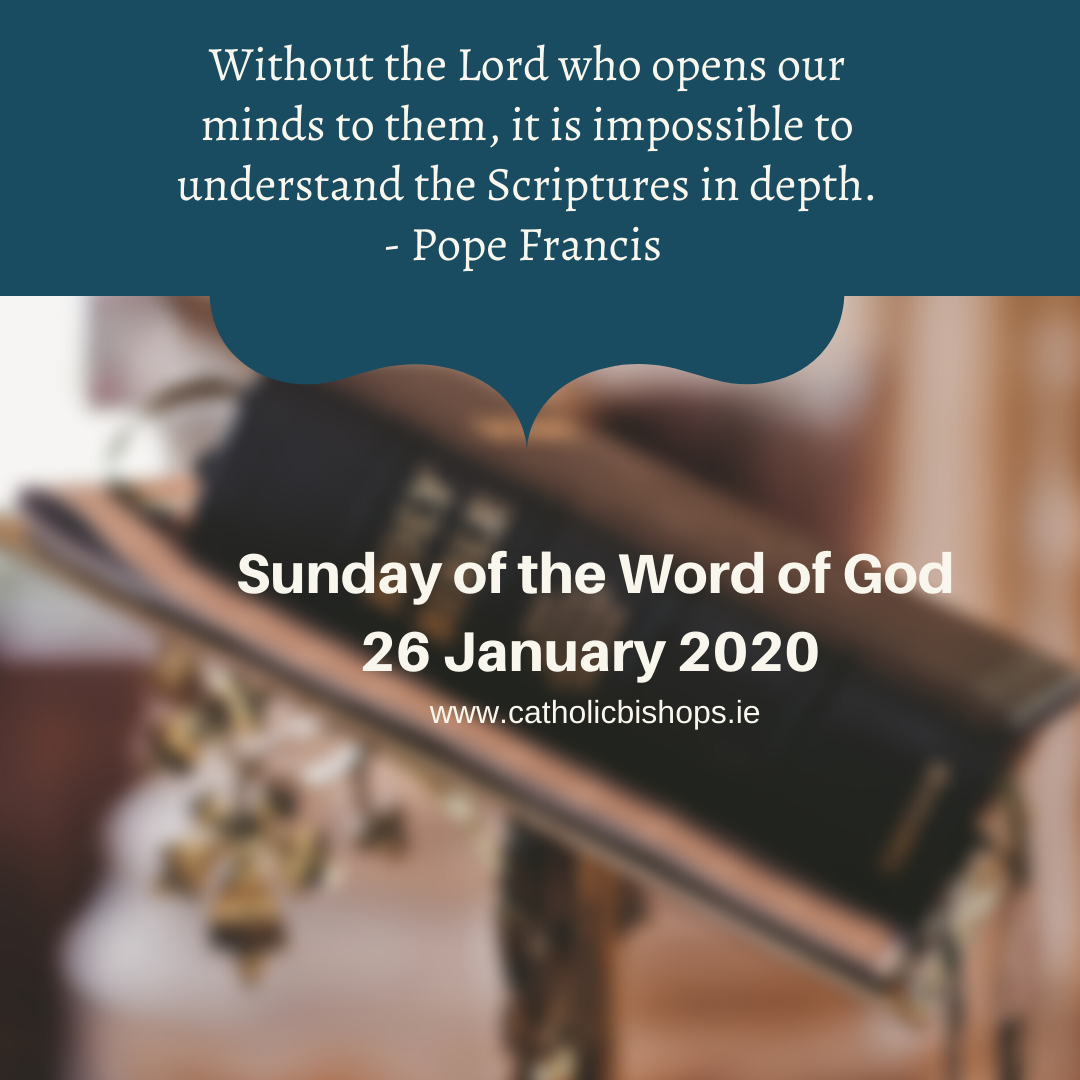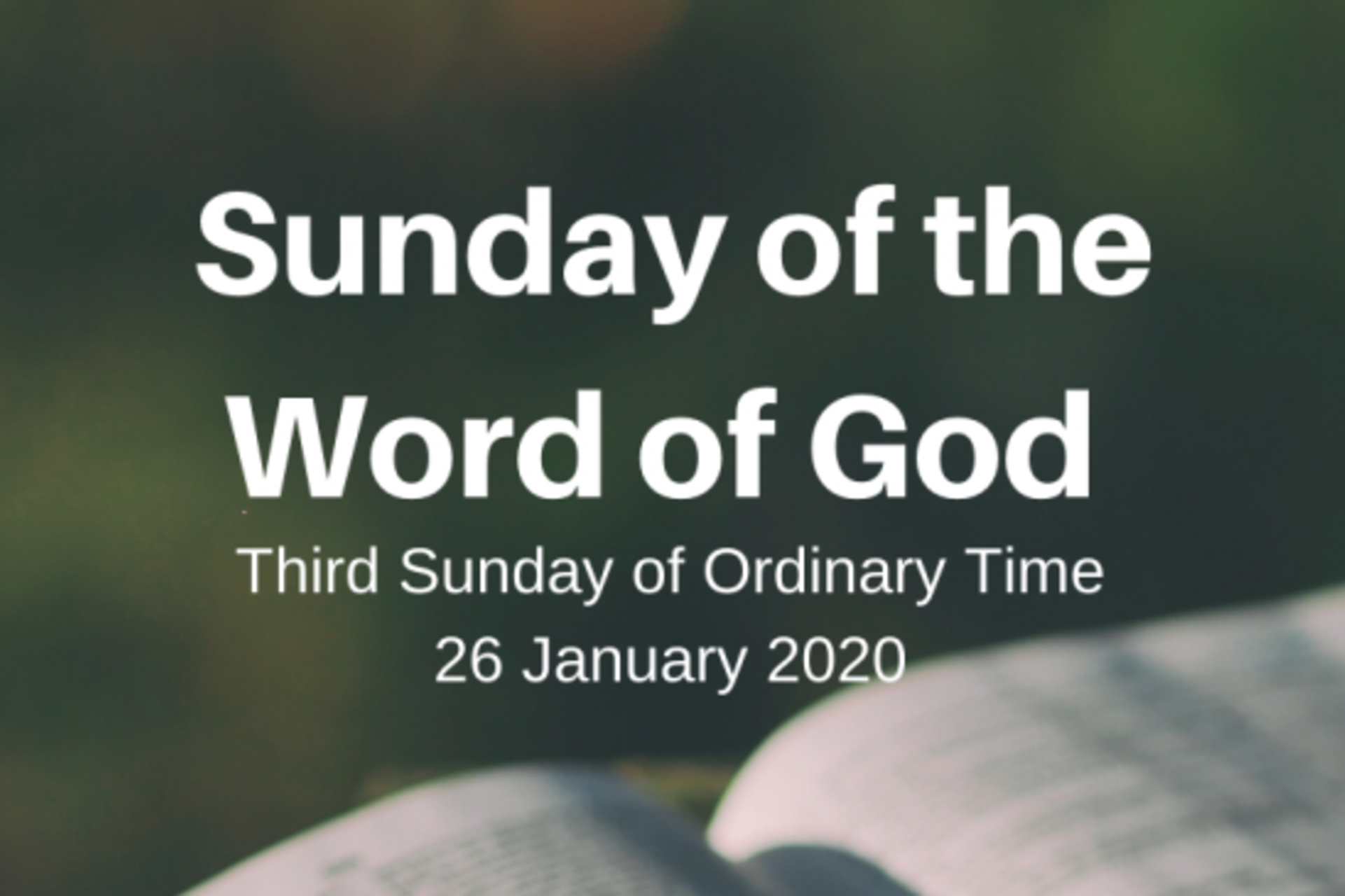
In his Apostolic Letter of 30 September 2019, Aperuit illis Pope Francis established that the Third Sunday in Ordinary Time is to be the Sunday of the Word of God.
Introduction
Pope Francis already proposed something similar at the end of the Extraordinary Jubilee of Mercy. It is a day to be devoted to the celebration, study, and spreading of the Word of God. Pope Francis is clear from the very first paragraph of this letter that the relationship between the Risen Lord, a community of believers, and sacred Scripture is essential to who we are as Christians.
The Sunday assembly gathering to celebrate the Eucharist is the unique moment in the week where a community gathers in a particular place and when their communal identity is nourished by Word and Sacrament. An important advance in 20th century theological reflection is that every sacramental celebration is founded and constructed upon the Word of God, and that every proclamation of the Word of God is sacramental.
While one might quibble with yet another Sunday being devoted to a particular theme that is superimposed on the liturgical celebration, this Sunday of the Word of God is certainly understood in a different way. It is not a new feast! After all, the Word of God is proclaimed at every Sunday Eucharist, and one of the great blessings of the liturgical reform and renewal flowing from the Second Vatican Council is a greater appreciation of the foundational role of the Word of God in every liturgical celebration. The reform of the lectionary has led to much more scripture being proclaimed during our liturgical gatherings and a greater awareness of the role of the Word of God in the life of faith.
This Sunday builds on the texts and prayers of the Third Sunday in Ordinary Time and is conscious that it comes just after the celebration of the Week of Prayer for Christian Unity. While we are not yet united around the table of the Eucharist, we do share on many Sundays of the year the same scriptural readings in our different Christian assemblies. Pope Francis urges us to strengthen our bonds with the Jewish people and to continue our prayer for Christian unity.
This Sunday is a time when the community is called to give greater attention not just to the Word of God. It is also urged to reflect on how we honour that Word in our celebrations, the books that we proclaim the Word from. Is the Gospel book carried in procession? Is it a well-made book that shows forth its life-giving content? Is it honoured with incense, and do we sing during the Gospel procession? Are the readers who proclaim the Word formed in the art of proclamation, and the knowledge of what they are announcing?
Pope Francis suggests in his letter that this Sunday is an ideal time to reflect on these issues. For presiders, it is also a call to reflect once again on their preaching of the Word of God. This Sunday might well be an appropriate time to commission and bless those who serve the community as readers, and initiate new ones to this essential ministry. If the parish community does not enthrone the Word of God every Sunday, maybe today is an opportunity to start. Another way of nourishing the role of scripture is praying quietly together in a lectio divina style of prayer. Why not gather a group for an hour and pray these particular scriptural lections?
The resources below have been prepared for the ‘Sunday of the Word of God’ by the the Faculty of Theology, Pontifical University, St Patrick’s College Maynooth:
Table of Contents
- Celebrating the Sunday of the Word of God
- What is the Word of God?
- The Holy Spirit and the Scriptures
- Opening the Law and the Prophets: On Reading the Old Testament as Christians
- Liturgy of the Word
- Reflection on the First Reading (Isaiah 8:23-9:3)
- Reflection on Psalm 26 (27)
- Reflection on the Second Reading (1 Corinthians 1:10-13, 17)
- Reflection on the Gospel Reading (Matt 4:12-23 or Matt 4:12-17)
- Homily
- Enthronement of the Word of God
- Commissioning or Blessing of Readers
- Commissioning Ministers of the Word
- General Intercessions in English and Irish
- Thought for the Day visuals
Celebrating the Sunday of the Word of God
In Aperuit illis (§3), Pope Francis suggests the following ways to celebrate the Sunday of the Word of God:
- Enthrone the sacred text.
- Highlight the proclamation of the Word of the Lord.
- Emphasise the honour due to the word of God in the homily.
- Celebrate the Rite of Installation of Lectors or a commissioning of Readers.
- Provide training for Readers.
- Give a Bible, or one of its books, to everyone.
- Encourage people to read and pray with Scripture daily, especially through the practice of lectio divina.
What is the Word of God?
We often identify the Bible as the Word of God. This is not wrong, but God speaks to our hearts in many different ways. For instance, he speaks to us in prayer and through our conscience, and often through other people. Hence, the Word of God covers much more than a printed book. Nevertheless, the Bible is the privileged collection of communications between God and his people. These stories and poems have nourished the lives of the people of Israel and the Christian Church right through the centuries, and they continue to nourish us today. They tell the story of God’s love and our salvation from ancient times onwards. The scriptural texts offer us both challenge and encouragement for our lives, and are especially valuable to us through the hope they offer us at dark moments.
The Holy Spirit and the Scriptures
The Holy Spirit was at work in the whole process of the formation of the Scriptures. This is why, even though many people across different times and places contributed to the writing, we believe that the Scriptures are divinely inspired. But the Holy Spirit’s work does not come to an end with the writing of the text. The Holy Spirit, who dwells in us by virtue of our baptism, is also at work in us as we listen to the text. Therefore, through the Spirit’s inspiration, the words of Scripture can become a living Word of the Lord to us here and now.
Opening the Law and the Prophets (see Luke 4:17): On Reading the Old Testament as Christians
When Saint Luke, in his Gospel, portrays the beginning of Jesus’ ministry, he does so in the following way:
Jesus came to Nazareth, where he had been brought up; and he went to the synagogue, as his custom was, on the Sabbath day. And he stood up to read; and there was given to him the book of the prophet Isaiah. He opened the book and found the place where it was written:
The Spirit of the Lord is upon me, because he has anointed me to preach good news to the poor. He has sent me to proclaim release to the captives and recovering of sight to the blind, to set at liberty those who are oppressed, to proclaim the acceptable year of the Lord. (4:16–18).
For Luke, the one in whom Christians place their trust as their Lord and Saviour, who is—in the words of the Nicene Creed—God from God, Light from Light, and who sits at the right hand of the Father, was, is, and remains, a Jewish male from Galilee. Our saviour is a Jew from Galilee. To lose sight of his essential and enduring Jewishness is to distort Jesus; it is to divorce him from his people, and to blind us to the reality and power of the Word made flesh (see John 1:14).
Jesus, the Galilean Jew, began his “public” life with words from his Scriptures. His life ended with word from his Scriptures: in his anguish of the cross, he prays the beginning of Psalm 21 (22): “My God, my God, why have you forsaken me?” To express what he’s about, and to say who he is, Jesus proclaims his Scriptures—what Christians call the Old Testament. Today also, truly to understand what God is doing in Christ (see 2 Cor 5:19), the followers of Christ are called to read and pray the Old Testament so that we may come to a sense of the mysteries that are veiled in all our lives and revealed in Christ (see St Augustine, On the Spirit and the Letter § 27).
Because the Old Testament communicates the mysteries of God’s life and ours, to come to know God’s word in the Old Testament is to know the power of God. This is why St Jerome famously says that ignorance of Scripture is ignorance of Christ: it is not that we gain “information” about Christ that is otherwise inaccessible; rather, to have one’s heart opened by the word of God is to come to know the one in whom the “the power and wisdom of God” has taken flesh. It is to know “Christ—the power of God and the wisdom of God” (1 Cor 1:24).
This means that Christians are called to read the Old Testament like Christ read it: in a way that opens the heart; that recognizes the faithfulness of God to his people and to the everlasting covenant made with them; that sees in the words of the Law, the Prophets, and the writings, the threshold of the Word of God. To read like Christ is to see the Law not as a burden, but as the revelation of God’s will. To read like Christ is to see in the Psalms the most wonderful school of prayer. To read like Christ is to submit oneself to the prophets’ call to justice and their witness to the power of God. To read like Christ is to read as one who is “last of all and servant of all” (Mark 9:35), who avoids all haughtiness and refuses to put the other in the wrong. Such a person resists the distortions of history which have caused so much suffering to God’s chosen people, the brothers and sisters of our Lord.
In this context, then, the “Sunday of the Word of God will be a fitting part of that time of the year when we are encouraged to strengthen our bonds with the Jewish people and to pray for Christian unity.” (Aperuit illis §3)
Liturgy of the Word
Isa 8:23b-9:3. In Galilee of the nations the people have seen a great light.
Psalm 26 (27). The Lord is my light and my help.
1 Cor 1:10-13, 17. Make up the differences between you instead of disagreeing among yourselves.
Matt 4:12-23 or 4:12-17. He went and settled in the Capernaum; in this way the prophecy of Isaiah was to be fulfilled.
Reflection on the First Reading (Isaiah 8:23-9:3)
The reading from Isaiah speaks of good news for the people of Galilee. Whereas previously they have lived in darkness, now they have seen a great light, and hence they can rejoice. The cause of their joy is the lifting of oppressive power that burdened them and weighed them down. This joyful light comes because a Davidic king has taken control as the Prince of Peace. We usually understand the text as speaking of the birth of a royal child: “There is a child born for us, a son given to us.” But in its original context, the passage may have applied when a new king (perhaps Hezekiah) ascended the throne. In Christian usage we think of the coming of the long-awaited “son of David”—Christ our Saviour. Not only did his birth bring rejoicing, but his adult arrival in Galilee to begin his public ministry brought light and hope to a troubled people. Christ offers us today his light and hope through the Scriptures.
Reflection on Psalm 26 (27)
Psalm 26 (27) overflows with confidence in the Lord. The Lord is the psalmist’s light, his help, his stronghold; the one with whom he wants to live. The Lord is the one in whom he has confidence; in whom he hopes; the source of his courage. This is a long way from psalms like Psalm 21 (22) and its cry of “My God, my God, why have you forsaken me.”
To pray this psalm by savouring its words is to be touched by its confidence in the Lord who is our light, our help, and our safe place; it is to permit us to be moved by the God whose real strength is not some mountain-moving power, but that which is discovered in the closeness of the One who embraces us, who holds us within.
To say the Psalmist’s words, over and over again, is to savour the sweetness of Lord. Gently to ruminate them is not only to “behold his temple”; it is to stand at its threshold. All we can do is stand at the threshold. Will the One who – through birth and death – brought Jesus to life in his house, not do the same for the sisters and brothers of Jesus?
Reflection on the Second Reading (1 Corinthians 1:10-13, 17)
St Paul writes to the Christian community in Corinth to challenge them to live the reality of the Word of God that he had preached to them. It is obvious that they have not taken that word to heart because their community is torn apart by rivalries and divisions. When our lives are transformed by the Word of God, they radiate peace, patience, harmony, love and acceptance of each other’s uniqueness. Pope Francis has said that unity in diversity is a sign that the Holy Spirit is at work. God does not make us all the same. That would be bland uniformity. But our differences should not lead to disunity or chaos either. When we allow God’s Word to transform our hearts and our imaginations, we will discover that we can celebrate each other’s differences even as we work towards a deeper unity in Christ. We will begin to recognise the huge variety of ways in which the Holy Spirit is at work among us and in the world.
“The Bible is the book of the Lord’s people, who, in listening to it, move from dispersion and division towards unity. The word of God unites believers and makes them one people.” (Aperuit illis §4)
Reflection on the Gospel Reading (Matt 4:12-23 or Matt 4:12-17)
The Word of God, proclaimed and heard at every Sunday liturgy, opens a dialogue between God and his people. Jesus is a model for entering into this dialogue. Jesus does not treat God’s word spoken in the Old Testament simply as a set of predictions, but he himself takes the initiative to fulfil scripture by retracing the steps of the prophecy of Isaiah. Christ preaches his word to people of all times, and so Jewish Galilee becomes Galilee of the nations. Especially in the proclamation of the Word of God at the liturgy, the Risen Christ is present, speaks, and desires to be heard. The imminent kingdom of heaven is now come through Christ’s death and resurrection. Through the work of the Spirit, the Risen Christ’s appeal to repent echoes in the deep recesses of believers’ hearts. Although we are among those in darkness, we now, in Jesus’ words, behold a great light and recognise his saving work. By engaging God’s word, and by beholding the light, we become changed, which is analogous to the transformation we undergo through participation at the table of the Lord. Our horizons expand as Jesus speaks of all nations and all peoples living under death’s shadow, and our hope extends for all our brothers and sisters in Christ, that together we might be one.
Homily
Words, words, words, we are surrounded by them. There is a surplus of talk, from early morning till late at night: chat shows, phone-in radio programmes that seem to be a flow of words; we can now even watch the radio on the television or on our computer screens, watching people talking. The power of words to create and sustain worlds and lives is ever before us. Words that can harm and damage lives and the sense of how people understand themselves; words that console and communicate; words of enduring and broken relationships. The human ability to speak and communicate is a constant wonder; its power and its fragility is ever before us. Words reflect the inner life of the person who spoke them.
How we speak is who we are. As Christians, we believe that all that is comes from the mouth of the One who spoke and all things were made. In the act of speaking, creation happens; it is a blessing or a curse for those who speak and those who listen and hear. In listening, the voice is heard, and recognition of the one who speaks may dawn. This dynamic of speaking, listening and knowing the one who speaks is the very dynamic of how God’s word is addressed to the people of Israel. God speaks and calls a people; they draw close to God in a gracious covenantal relationship. Their relationship endures and continues to this day.
Jesus also calls to himself a group of disciples in today’s gospel account. He invites them to come and walk in his ways. Through their response, they set out on a path of discipleship leaving all behind them; it is a way that will lead some of his followers to martyrdom and others to betrayal: words of fidelity and words of treachery. The Scriptures nurture the path of the disciples in their following of Jesus and walking in his ways, by taking the word and allowing it to shape and mould our identity as Christians. The word proclaimed every Sunday in our Eucharistic celebration; the word heard in the very ordinary circumstances of our daily lives; the words that we speak every moment; let all of them be, for us, moments of salvation and gifts to others.
As ever, the Word that is proclaimed in the midst of the celebrating assembly names that very community. Today we hear that we are the people who walk in darkness, but we have received the gift of a great light. Communities are, or have been, in the past riven by dissension, at times perhaps even for very good reasons; but this can tear apart the fabric of discipleship. Rather than being for Christ, different groups and parties can multiply. Christ continues to call every disciple by name to come and walk with him. The Proclaimed Word is a Word not just in the past, but a Word here and now, given to this liturgical assembly to shape, challenge and sustain their ongoing following of the Lord. Every time a Christian community gathers, it is making a bold statement about where they have come from, who they are, and where they hope one day to be. The Scriptures nourish the boldness of the community; once more today we are urged to allow the Word of God to nourish us as both individuals and communities.
Enthronement of the Word of God
In paragraph 3 of Aperuit illis, Pope Francis requests that “the various communities will find their own ways to mark this Sunday with a certain solemnity. It is important, however, that in the Eucharistic celebration the sacred text be enthroned, in order to focus the attention of the assembly on the normative value of God’s word”.
It is hard to see how enthronement of the Word might take place within the celebration of the Eucharist. What is perhaps envisaged here is that attention is given to the carrying of the Book of the Gospels in the procession at the start of the celebration, and that it be then placed on the altar.
During the procession, the Book is raised, and can be seen by the congregation. During the singing of the Alleluia, a solemn procession with candles and incense accompanies the Book of the Gospels to the ambo where it is incensed, honoured, and kissed. The lectionary should never be carried in this way.
Some groups with a biblical apostolate propose enthroning the Word of God in a domestic setting. Several online examples are available, for instance, on the website of the United States Conference of Catholic Bishops: http://www.usccb.org/beliefs-and-teachings/how-we-teach/catechesis/catechetical-sunday/human-dignity/enthroning-the-bible.cfm
Commissioning or Blessing of Readers
The Pope also speaks about Bishops celebrating the Rite of Installation of Lectors or a Commissioning of Readers. The ministry of Reader in a parish community could well be highlighted on this Sunday. Perhaps a formation session might be organised during this week for readers; new readers could be recruited; or those who have served the community as readers could renew their commitment and new readers begin their ministry. As always, formation for this, or indeed any ministry, is crucial. A parish could have a commissioning of ministers of the Word during the Sunday Eucharist, or may decide to have a prayer of blessing.
An Order for the Blessing of Readers is available in chapter 61 of the Book of Blessings (USA version). Two options are provided: one within the celebration of Mass, and the other within a celebration of the Word of God. Both are parish celebrations, and the blessing is given by the parish priest. After the Prayer of the Faithful, the readers are blessed and may be presented with a lectionary or a Bible. The following is the prayer of blessing (Prayer of Blessing, n. 1833):
With hands extended over the new readers, the celebrant says immediately:
Everlasting God,
when he read in the synagogue at Nazareth,
your Son proclaimed
the good news of salvation for which he would give up his life.
Bless these readers.
As they proclaim your words of life,
strengthen their faith
that they may read with conviction and boldness,
and put into practice what they read.
We ask this through Christ our Lord.
Commissioning Ministers of the Word
After the Homily, those to be commissioned (or re-commissioned) as parish Readers are presented to the people in these or similar words:
Dear Friends in Christ,
Our friends are given the great privilege of proclaiming God’s Word in the Assembly. Through them, God will speak to his people of the salvation and redemption won for them by the Lord Jesus, so that, nourished by this word, the people will grow in the love and the knowledge of God.
(The celebrant pauses and then addresses the candidates)
You have been called to proclaim the Word of God in the assembled community of God’s people, and in so doing you are sharing in the Church’s mission to preach the Good News to all peoples. May God’s Word be living and active in your lives, that you may worship the living God in spirit and in truth. In proclaiming God’s word to others, accept it yourself in obedience to the Holy Spirit. Meditate on it constantly, so that each day you will have a deeper love for the Scriptures, and in all you say and do, show forth to the world our Saviour, Jesus Christ.
After the address, the candidates stand before the celebrant who asks them these questions:
Are you willing to act as a Minister of the Word and to proclaim God’s word to the people assembled in this Church?
(I am)
Are you willing to prepare each proclaiming of God’s word by study and prayer?
(I am)
The celebrant then hands a Lectionary or Bible to a representative of (or to all the readers) and prays:
Let us pray to God our loving Father and ask him to bless our brothers and sisters chosen to proclaim His Word:
God our Father, you have given our brothers and sisters faith in you and in your living word. We ask you to help them grow in that faith as they meditate on your word, so that they may worthily proclaim the word to the assembly, and by the manner of their lives. Through Christ our Lord.
General Intercessions
Introduction:
Gathered as the people of God, sustained by the Word of God, and called to be disciples of Christ, together let us pray:
For the Church: that rooted in the Word of God, we may continue to build up the Body of Christ and promote the common good.
Lord hear us. R/. Lord graciously hear us.
For Christian leaders: that they walk in the ways of the Lord and encourage others to do the same.
Lord hear us. R/. Lord graciously hear us.
For peace among nations: that God would inspire light to shine on all parts of the world that know the darkness of division and war.
Lord hear us. R/. Lord graciously hear us.
For all who teach and preach the Word of God: that their words may renew the faith of those who listen and encourage them to trust in the promise of God.
Lord hear us. R/. Lord graciously hear us.
For this community: that we may have an ever-greater openness to the Word of God and allow it to enlighten the darkness of our hearts and free us to follow Jesus evermore faithfully.
Lord hear us. R/. Lord graciously hear us.
For healing between Christian churches and communities: that God will free us from past rivalries and wounds, so that all Christians may work together in serving Christ who calls us to be one.
Lord hear us. R/. Lord graciously hear us.
Where readers are blessed, the concluding prayer of the Prayer of the Faithful is the prayer of blessing as given above.
Idirghuíonna Ginearálta
Réamhrá:
Agus sinn cruinnithe mar phobal Dé, arna gcothú le Briathar Dé, agus arna ngairm chun bheith inár ndeisceabail ag Críost, guímis le chéile:
Ar son na hEaglaise: agus sinn fréamhaithe i mBriathar Dé, go leana muid orainn ag cur le Corp Chríost agus leas an phobail a chur chun cinn.
A Thiarna, éist linn. F/. A Thiarna, bí ceansa agus éist linn.
Ar son ceannairí Críostaí: go siúla siad i mbealaí ár dTiarna agus go spreaga siad daoine eile chun déanamh amhlaidh.
A Thiarna, éist linn. F/. A Thiarna, bí ceansa agus éist linn.
Ar son na síochána i measc náisiún: go ngríosfadh Dia solas chun soilsiú ar gach cearn den domhan ina bhfuil cur amach ag na daoine iontu ar dhorchadas an easaontais agus na cogaíochta.
A Thiarna, éist linn. F/. A Thiarna, bí ceansa agus éist linn.
Ar son na ndaoine go léir a mhúineann agus a chraobhscaoileann Briathar Dé: go ndéana a gcuid focal creideamh na ndaoine a éisteann leo a athnuachan agus iad a spreagadh chun muinín a bheith acu as gealltanas Dé.
A Thiarna, éist linn. F/. A Thiarna, bí ceansa agus éist linn.
Ar son an phobail seo: gur mó fós an oscailtealacht a bheidh againn do Bhriathar Dé agus go lige muid dó dorchadas ár gcroíthe a shoilsiú agus sinn a shaoradh chun gur dílse fós a leanfaimid Íosa.
A Thiarna, éist linn. F/. A Thiarna, bí ceansa agus éist linn.
Ar son cneasú idir eaglaisí Críostaí agus pobail Chríostaí: go saorfaidh Dia sinn ó sheanchoimhlintí agus seanghortuithe, ionas go n-oibreoidh Críostaithe uile le chéile ag freastal ar Chríost, a iarrann orainn bheith aontaithe.
A Thiarna, éist linn. F/. A Thiarna, bí ceansa agus éist linn.
I gcás ina ndéanfar léitheoirí a bheannú, is í paidir an bheannaithe, arna tabhairt thuas, guí dheiridh Ghuí an Phobail.
Thought for the Day visuals for sharing on Social Media
These visuals are selected quotes from Pope Francis from his Apostolic Letter of 30 September 2019, Aperuit illis and can be shared on social media to coincide with the celebration of the Sunday of the Word.
Contributors:
Dr Jeremy Corley, Dr Luke Macnamara, Prof. Séamus O’Connell, Dr Jessie Rogers, Prof. Salvador Ryan, and Prof. Liam Tracey.
Thought for the Day visuals designed by Brenda Drumm, Catholic Communications Office.
